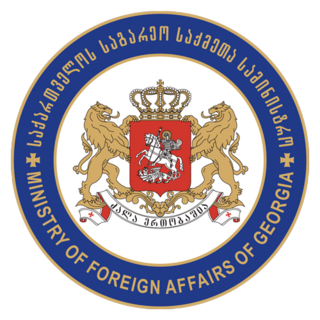List of diplomatic missions in Georgia may refer to:
List of diplomatic missions in Georgia may refer to:
The implementation of the Dayton Accords of 1995 has focused the efforts of policymakers in Bosnia and Herzegovina, as well as the international community, on regional stabilization in the countries-successors of the former Yugoslavia. Relations with its neighbors of Croatia, Montenegro and Serbia have been fairly stable since the signing of the Dayton Agreement in 1995.

Fiji has experienced many coups recently, in 1987, 2000, and 2006. Fiji has been suspended various times from the Commonwealth of Nations, a grouping of mostly former British colonies. It was readmitted to the Commonwealth in December 2001, following the parliamentary election held to restore democracy in September that year, and has been suspended again because of the 2006 coup, but has been readmitted a second time after the 2014 election. Other Pacific Island governments have generally been sympathetic to Fiji's internal political problems and have declined to take public positions.

Georgia's location, nestled between the Black Sea, Russia, and Turkey, renders it strategically important. It is developing as the gateway from the Black Sea to the Caucasus and the larger Caspian region, but also serves as a buffer between Russia and Turkey. Georgia has a long and tumultuous relationship with Russia, but it is reaching out to its other neighbours and looking to the West in search of alternatives and opportunities. It signed a partnership and cooperation agreement with the European Union, participates in the Partnership for Peace, and encourages foreign investment. France, Germany, South Korea, the United Kingdom, and the United States all have embassies in Tbilisi. Georgia in 2004-2008 sought to become a member of NATO, but did not succeed in the face of strong Russian opposition.

Liechtenstein's foreign economic policy has been dominated by its customs union with Switzerland. This union also led to its independent membership in the European Free Trade Association (EFTA) in 1991. Unlike Switzerland however, Liechtenstein is part of the European Economic Area.

After independence in 1964, Malta followed a policy of close co-operation with NATO countries. Since 1971, the country sought relations with the rest of the world, including communist countries in Eastern Europe and the non-aligned countries.

An apostolic nunciature is a top-level diplomatic mission of the Holy See that is equivalent to an embassy. However, it neither issues visas nor has consulates.

The Ministry of Foreign Affairs of Georgia is a governmental body of Georgia responsible for protecting and promoting Georgia’s interest and its persons and entities abroad. The Ministry is led by the Minister of Foreign Affairs who is appointed by the Prime Minister of Georgia as a member of cabinet. The position is currently held by Ilia Darchiashvili, in office since 04 April 2022.

The 1955 Austrian State Treaty ended the four-power occupation and recognized Austria as an independent and sovereign state. In October 1955, the Federal Assembly passed a constitutional law in which "Austria declares of her own free will her perpetual neutrality." The second section of this law stated that "in all future times Austria will not join any military alliances and will not permit the establishment of any foreign military bases on her territory." Since then, Austria has shaped its foreign policy on the basis of neutrality.

Visitors to Albania must obtain a visa from one of the Albanian diplomatic missions unless they come from one of the visa exempt countries or are qualified for visa-free entry.

Visitors to Georgia must obtain a visa from Georgian diplomatic missions unless they come from one of the visa exempt countries or one of the countries whose citizens can obtain an e-Visa. Visitors must hold a passport valid for the period of intended stay, while Georgian citizens can enter with a valid or expired passport or identity card.

The Embassy of the Kingdom of Denmark in Kyiv is the diplomatic mission of Denmark in Ukraine.

The Embassy of Georgia in London is the diplomatic mission of Georgia in the United Kingdom. Diplomatic relations between the two countries were originally established in 1919, effectively terminated after 1921, but restored in 1992 following dissolution of the Soviet Union.

Foreign relations of Djibouti are managed by the Djiboutian Ministry of Foreign Affairs and International Cooperation. Djibouti maintains close ties with the governments of Somalia, Ethiopia, France and the United States. It is likewise an active participant in African Union, United Nations, Non-Aligned Movement, Organisation of Islamic Cooperation and Arab League affairs.